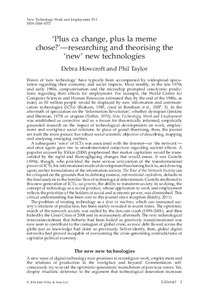"Plus ca change, plus la même chose?", researching and theorising the "new" new technologies

Howcroft, Debra ; Taylor, Phil
New Technology, Work and Employment
2014
29
1-8
economic impact ; employment ; technological change ; work ; digitalisation
Technology
http://dx.doi.org/10.1111/ntwe.12026
English
Bibliogr.
"Waves of ‘new technology' have typically been accompanied by widespread speculation regarding their economic and social impacts. Most notably, in the late 1970s and early 1980s, computerisation and the microchip prompted cataclysmic predictions regarding their effects for employment. For example, the World Centre for Computer Sciences and Human Resources estimated that, by the end of the 1980s, as many as 50 million people would be displaced by new information and communication technologies (ICTs) (Braham, 1985, cited in Boreham et al., 2007: 3). In the aftermath of speculation on the ‘Information Revolution', whether dystopian (Jenkins and Sherman, 1979) or utopian (Toffler, 1970), New Technology, Work and Employment was established as corrective and as a forum for theoretically informed, empirically grounded research on the impact of technological developments on work, employment and workplace social relations. In place of grand theorising, then, the journal set itself the more prosaic but robust social scientific objective of describing, mapping and analysing emerging realities."
Digital
The ETUI is co-funded by the European Union. Views and opinions expressed are however those of the author(s) only and do not necessarily reflect those of the European Union or the ETUI.